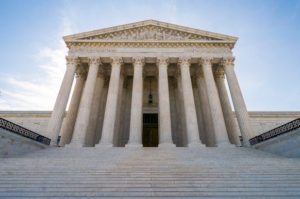
The Supreme Court issued an order yesterday allowing the Trump administration to begin enforcing new limits on immigrants who are considered likely to become overly dependent on government benefit programs.
The court voted 5-4. Justices Ruth Bader Ginsburg, Stephen Breyer, Sonia Sotomayor and Elena Kagan said they would have left a lower court ruling in place that blocked enforcement while a legal challenge works its way through the courts. The Department of Homeland Security announced in August that it would expand the definition of “public charge,” to be applied to people whose immigration to the United States could be denied because of a concern that they would primarily depend on the government for their income.
In the past, that was largely based on an assessment that an immigrant would be dependent upon cash benefits. But the Trump administration proposed to broaden the definition to include noncash benefits, such as Medicaid, supplemental nutrition and federal housing assistance.
Anyone who would be likely to require that broader range of help for more than 12 months in any three-year period would be swept into the expanded definition. But in response to a lawsuit filed by New York, Connecticut, Vermont, New York City and immigrant aid groups, a federal judge in New York imposed a nationwide injunction, blocking the government from enforcing the broader rule.
The acting deputy secretary of the DHS, Ken Cuccinelli, said the proposed rules would reinforce “the ideals of self-sufficiency and personal responsibility, ensuring that immigrants are able to support themselves and become successful here in America.” The Trump administration urged the Supreme Court to lift the nationwide injunction imposed by the New York trial judge, given that two appeals courts have come to the opposite conclusion.
Justices Neil Gorsuch and Clarence Thomas said yesterday that district court judges have been issuing nationwide injunctions much more often. They called on their colleagues to review the practice, which they said has spread “chaos for the litigants, the government, the courts, and all those affected by these conflicting decisions.”

Recent Comments